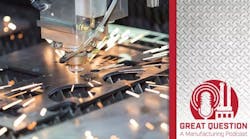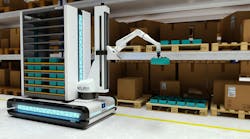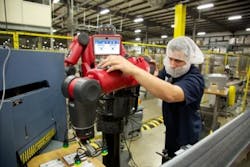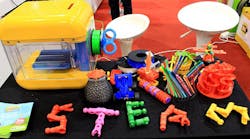If you know anyone graduating from college this month, you may want to offer them a side of condolences to go along with all the congratulations they will be receiving. The average 2016 class graduate is leaving campus with $37,172 of student loan debt. Even if you're not a math major, you should know that with interest, that calculates to "You're screwed + a long, long time."
America as a whole owes $1.23 trillion to 43 various student loan borrowers. That's $120 billion more than the entire 2015 federal discretionary spending budget, which includes military, education, social security, international affairs -- pretty much everything.
Forbes recently asked Mike Rowe, creator and host of Dirty Jobs and Somebody's Gotta Do It, what his advice to parents of current and prospective college-bound kids:
Rowe said:
I try and avoid giving advice to people I don’t know, but if my kids showed any level of mechanical aptitude, or expressed any enthusiasm for tinkering or repairing or fixing things, I’d encourage them to investigate every opportunity in the skilled trades. Likewise—if they had a four-year degree and a mountain of student debt and couldn’t find work in their chosen field and refused to relocate—I’d make any future support conditional upon their willingness to mastering a useful skill.
So the next time your barista nephew with the philosophy degree bitches about the size of the military, feel free to disseminate that stat. Also, when his parents say "At least he has a good education," feel free to slap them with your forklift-controlling wearable glove.
That hypothetical situation might only occur in real life at my house around the holidays, but there seems to be a growing sentiment among parents that manufacturing jobs aren't good enough for their precious children. You can probably recall several bits of anecdotal evidence to back up this claim, and a survey by SME delivers some quantitative data that seems to support the belief.
The manufacturing advocacy group surveyed 577 parents (62% female/37% male) nationwide to glean their attitudes on manufacturing.
Three of the most glaring findings:
- More than 20% of parents surveyed view manufacturing as an outdated and/or dirty work environment.
- Half of all respondents do not see manufacturing as an exciting, challenging or engaging profession.
- Nearly one-quarter of parents surveyed do not feel that manufacturing is a well-paying profession.
“The landscape in advanced manufacturing has evolved,” says Jeffrey Krause, CEO of SME. “A serious misconception is that manufacturing is dirty, dark or dangerous; and isn’t seen as an optimal career choice. The reality is far from that.”
“Manufacturing today is an advanced, high-value industry that represents innovation and technology," Krause adds. "The survey results demonstrate that we need to show that manufacturing careers can be exciting, stimulating, and very rewarding.”
It's important to note more than 8 out of 10 surveyed do not work in manufacturing, so their views in this era of participation awards and safe spaces are somewhat to be expected.
SME counters these misconceptions:
- Many of today’s manufacturing environments look more like clean rooms, with laboratory-like settings.
- Manufacturing offers career opportunities for every education level ranging from skilled trades that require a high school diploma or GED to engineers, designers, and programmers with bachelor’s and master’s degrees and researchers and scientists with PhDs.
- For every $1 spent in manufacturing, another $1.37 is added to the economy—the highest multiplier effect of any economic sector.
- Technological advancements are yielding well-paying careers—the average U.S. manufacturing worker makes $77,506.
- The use of 3D design and computer-aided engineering software is attracting students interested in non-traditional careers such as game design and animatronics
Now is actually the perfect time to get into manufacturing, but with an advanced discipline in mind.
The 3D printing worldwide market is expected to grow to $13.4 billion in 2018, more than eight times the current $1.6 billion value. And last year, $1.8 billion were ordered from North American companies, an increase of 14%, according to Robotic Industries Association.
Vocational schools offer two-year degrees in both, and there should be plenty of jobs ready for those who want them.
SME reports that" An estimated 3.5 million manufacturing jobs will become available in the next 10 years but without the right skilled workers for the jobs, an estimated 2 million of those jobs could go unfulfilled."
So what do you think? Do you think more parents should encourage their children to find a career in manufacturing? Tell us in the comments below!


















